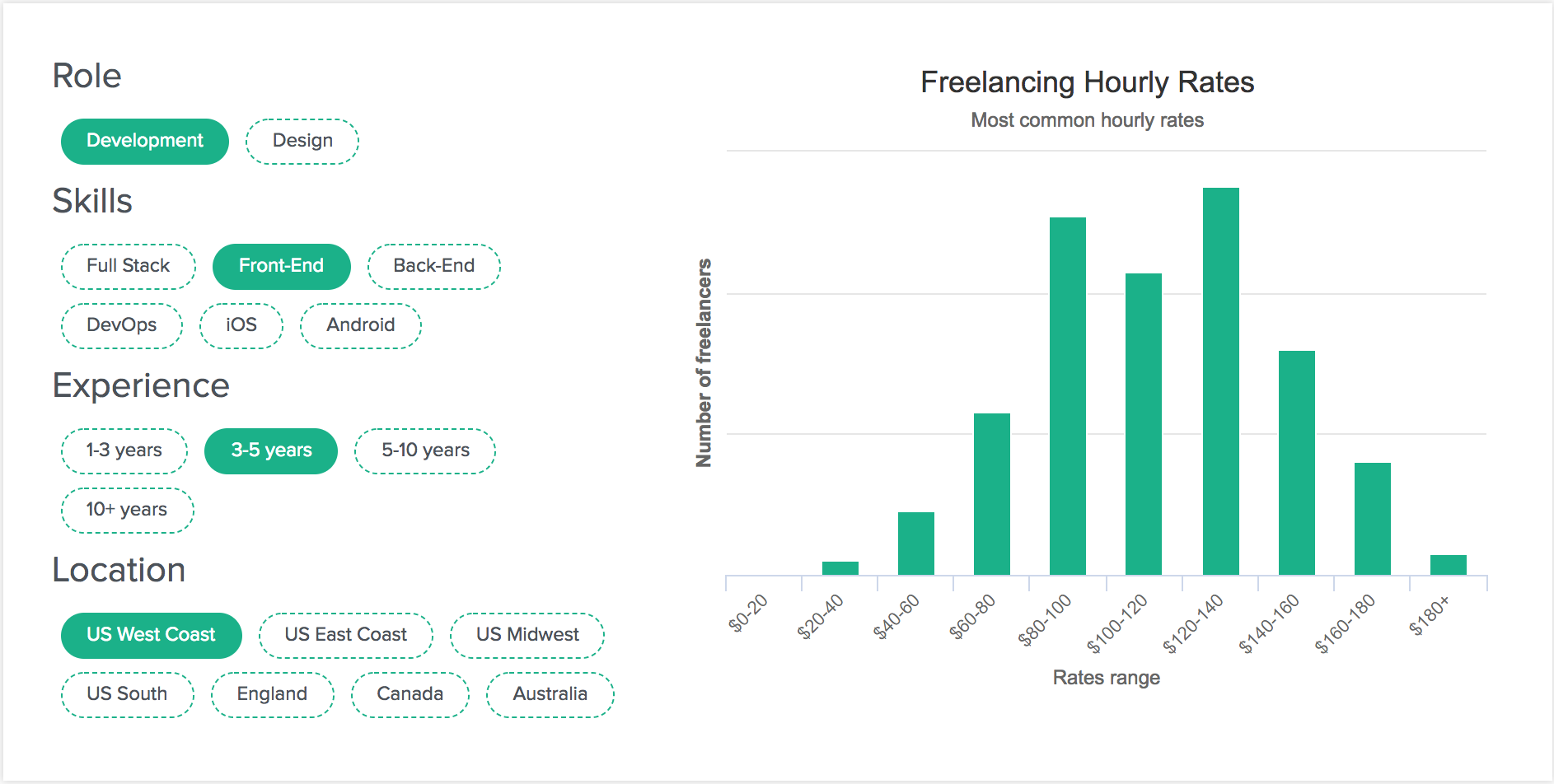There are many challenges a freelance web developer or designer will come across in their first few years of business. One issue that is more difficult to resolve (and may continue to be an obstacle throughout your web design business) is pricing, especially when sending a new proposal template. Everyone struggles with this concept – not just newbies!
What's a fair price for a website? How much is too much? Is it okay to be competitive? Should you opt for premium pricing? With so many questions surrounding your fees, it can be overwhelming to know where to start. We'll attempt to help you formulate a flexible but successful pricing strategy to use throughout your freelance lifetime!
1. What do I bring to the table?
Determining your charges for a website development project can be a complex process. One method to help you decide is to examine the specific website development steps involved. After understanding the work required in each step, you can better estimate an appropriate rate.
Not all developers and designers are created equal. In fact, someone with just three years of experience can charge significantly more than someone who is building their first client website. So, how can you judge your worth? There are usually four components to determining what someone might pay for your website services:
1.1 Your experience
It’s true that those with more practice should get paid more. Someone just starting out will not be able to charge high-end pricing for their first job. It’s just the way it is.
1.2. Your specialty
Do you offer a specific tech skill or design element that's in-demand? Perhaps you're just one of a few professionals in your niche that can handle a very new software offering. Maybe you're adept at working in a very regulated industry (such as finance, legal, or medical) and know the ins and outs of what is required for that field. If you can offer something unique and sought-after, you can ask more than if you are very general in your skillset and lack any high-specialized knowledge.
1.3. Your tools
Will you be building everything from the ground up or using a CMS such as WordPress? Using templates or drag-and-drop tech? Those who are creating a truly customized product from the very first line of code or a blank design canvas can ask for more than those who are using pre-built design elements. (Note that one way isn’t better than the other, but one will cost more.)
1.4. Your timing
Many in-demand site builders have waiting lists that are many months long. New developers and designers, however, have the advantage of a shorter client list and the ability to turn work around quickly. If you’re open to “rush” jobs with tight timelines, you can ask for much more than someone with a backlog and no ability to do work with tight deadlines.

2. What are people paying?
The website creation industry is an accurate representation of free market principles. You can charge what you wish, and your customers are free to hire you – or find someone with a price that's more in line with their budget. As such, you're best not to ask "what can I charge?" but rather "what are people paying?" You'll probably find that the second question gets you a much better price in the end.
To find out what people are paying for websites, use crowdsourcing tools like Quora.com, Facebook, or competitor’s websites. You’ll find many people willing to share what they have been paying for their websites. A competitor’s site may list rates, as well (and if they have any past clients to showcase, they’ve proven that price is likely realistic.)

Freelance developers and designers also talk amongst each other to discuss what might be fair pricing. There are also many blog posts and articles sharing pricing strategy. These have quotes the following to be fair ranges for market averages:
2.1 Developers:
Pay per hour: $100 - 180
Pay per project: $3,000 - $12,000 for custom design and development
Ongoing support billed annually: $500 – 1,000
2.2 Designers:
Pay per hour: $50-80
Pay per project: $275 – 550 (average of a 4-page project)
Ongoing support billed annually: $100 – 600 annually
There will be additional fees for logo design and other branding elements, such as social media profile logos, avatars, and website favicons. If you use any stock photography elements in your design, these should be incorporated into your cost, as well.

Bonus Tip: Bonsai’s freelance rate explorer is also a reliable resource for seeing what people are getting paid at various stages of their career in many different regions across the world. It's apparent from these numbers (and those revealed above) that developer can charge far more than designers. If you have any overlap in your skills and can cross into development from design (or offer a mixture of both), you can earn far more than a designer alone.
3. Who is my client?
Here’s an honest fact about those who create and sell websites: You don’t have to charge everyone the same. It’s not just customization of the site that will cause the price tag to vary wildly; it will also depend on who is purchasing. The more money a client has to spend on a website, the more likely they are to feel like they should spend more on a website. Therefore, you should be charging them more for one.
Is it cheating to charge a Fortune 500 company twice as much for website as a small mom and pop shop down the street? No. The Fortune 500 has likely budgeted much more for the project and would probably find you not qualified for the job if you undercharged. Likewise, they will likely have higher expectations and the likelihood of “scope creep" is higher with the Fortune 500 client. Don't feel sorry about quoting higher in your proposals to big companies. You're likely going to have to play the averages and charge a variety of prices over all of your clients to get you to the point where you are earning enough to thrive. It’s a fact of life for freelancers!
4. What else can I offer?
When you’re hired to develop or design a website, don’t forget about the opportunity to upsell. You may think that upselling for a website is limited to customization, logo add-ons, and similar details. In fact, you may also have the chance to add in other marketing services, provided you have experience in the services. If you happen to be a whiz at SEO, include an SEO audit on their final copy as an upsell for a higher-priced package. If you know a thing or two about social media management, offer to design their social media assets and set up, as well as optimize, their Facebook and LinkedIn company pages to help provide consistent branding across all of their digital marketing channels (not just their website.)
Be sure only to offer those things you know how to do, but don’t be limited to just what they ask you to quote them on. They may not know you can provide these services (and you would be doing them a favor by being a one-stop shop for their design needs). They may also not realize that these services are needed. Your offer to assist is an educational service that can help them develop a more comprehensive marketing plan that goes beyond just their website.
As you can see, there are a lot of factors to consider when quoting a website project to a prospect. All freelancers make mistakes – especially early on. The good news is that everyone gets better at approaching projects and pricing fairly. The best thing you can do is just get started! Submit your quote, manage your web design invoices and contracts, and track your time with a free Bonsai trial. Take a look at our service invoice template for something a bit more general.






